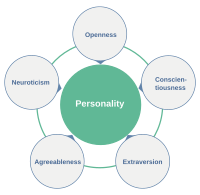
A framework for treating DSM-5 alternative model for personality disorder features.
Sign Up to like & getrecommendations! Published in 2018 at "Personality and mental health"
DOI: 10.1002/pmh.1414
Abstract: Despite its demonstrated empirical superiority over the DSM-5 Section 2 categorical model of personality disorders for organizing the features of personality pathology, limitations remain with regard to the translation of the DSM-5 Section 3 alternative… read more here.
Keywords: framework treating; model personality; pathology; model ... See more keywords

Schizotypy from the Perspective of the DSM-5 Alternative Model of Personality Traits: a Study on a Sample of 1056 Italian Adult University Students
Sign Up to like & getrecommendations! Published in 2019 at "Journal of Psychopathology and Behavioral Assessment"
DOI: 10.1007/s10862-019-09718-1
Abstract: To assess the relationships between schizotypy measures and DSM-5 Alternative Model of Personality Disorders (AMPD) traits, 1056 (69.4% female; mean age = 23.30 years) University students, were administered the Italian translation of the Schizotypal Personality Questionnaire (SPQ), Schizotypal… read more here.
Keywords: dsm alternative; model; model personality; university students ... See more keywords

Towards a consensual model in personality psychology
Sign Up to like & getrecommendations! Published in 2019 at "Personality and Individual Differences"
DOI: 10.1016/j.paid.2019.03.009
Abstract: Abstract After dealing with the question of why a consensual model of personality is required, two major assumptions are presented concerning the suggested model: that personality is a system and that it consists of interrelated… read more here.
Keywords: psychology; model personality; towards consensual; consensual model ... See more keywords

Five Factor Model Personality Traits and Subjective Cognitive Failures.
Sign Up to like & getrecommendations! Published in 2020 at "Personality and individual differences"
DOI: 10.1016/j.paid.2019.109741
Abstract: Momentary lapses in memory, perception, or action, known as cognitive failures, are relatively common. These lapses may reflect, in part, aspects of psychological functioning, such as personality traits. The present research addresses how Five Factor… read more here.
Keywords: personality traits; factor model; five factor; model personality ... See more keywords

Five-Factor Model Personality Domains and Facets Associated with Markers of Cognitive Health.
Sign Up to like & getrecommendations! Published in 2022 at "Journal of individual differences"
DOI: 10.1027/1614-0001/a000383
Abstract: Using a diverse, age-stratified sample (N=3,478; age range 18-90) this study examines the cross-sectional association between five-factor model personality traits - domains and facets - and three measures of cognitive health - processing speed, visuospatial… read more here.
Keywords: five factor; factor model; model personality; personality ... See more keywords

Thoughts on the assessment of the DSM-5 alternative model for personality disorders: Comment on Sleep et al. (2019).
Sign Up to like & getrecommendations! Published in 2019 at "Psychological assessment"
DOI: 10.1037/pas0000710
Abstract: In a recent article, Sleep, Lynam, Widiger, Crowe, and Miller (2019) examined various properties of measures of Criterion A and Criterion B of the Alternative Model for Personality Disorders presented in DSM-5. This commentary discusses… read more here.
Keywords: thoughts assessment; personality disorders; model personality; personality ... See more keywords

Discriminant validity of the alternative model of personality disorder.
Sign Up to like & getrecommendations! Published in 2020 at "Psychological assessment"
DOI: 10.1037/pas0000955
Abstract: The Diagnostic and Statistical Manual of Mental Disorders (DSM)-5 Section III alternative model of personality disorder (AMPD) was developed to rectify some of the failings of the DSM-IV personality disorders, including a lack of compelling… read more here.
Keywords: discriminant validity; alternative model; model personality; personality ... See more keywords

Examining the Relations Among the DSM–5 Alternative Model of Personality, the Five-Factor Model, and Externalizing and Internalizing Behavior
Sign Up to like & getrecommendations! Published in 2018 at "Personality Disorders: Theory, Research, and Treatment"
DOI: 10.1037/per0000240
Abstract: Given long-standing criticisms of the DSM’s reliance on categorical models of psychopathology, including the poor reliability and validity of personality-disorder diagnoses, the American Psychiatric Association (APA) published an alternative model (AM) of personality disorders in… read more here.
Keywords: externalizing internalizing; factor model; model personality; model ... See more keywords

Examining the Interpersonal Nature of Criterion A of the DSM–5 Section III Alternative Model for Personality Disorders Using Bootstrapped Confidence Intervals for the Interpersonal Circumplex
Sign Up to like & getrecommendations! Published in 2018 at "Journal of Personality Assessment"
DOI: 10.1080/00223891.2018.1464016
Abstract: ABSTRACT Criterion A of the alternative model of personality disorders (AMPD) involves the assessment of impairments in self and self in relation to other functioning and can be assessed using the Level of Personality Functioning… read more here.
Keywords: criterion; personality disorders; ampd cas; model personality ... See more keywords

Using the Personality Assessment Inventory to Assess the Alternative Model for Personality Disorders: Criterion Validity in a Clinical Sample.
Sign Up to like & getrecommendations! Published in 2023 at "Journal of personality assessment"
DOI: 10.1080/00223891.2023.2203240
Abstract: The Personality Assessment Inventory (PAI) is a broadband measure of psychopathology that is widely used in applied settings. Researchers developed regression-based estimates that use the PAI to measure constructs of the Alternative Model for Personality… read more here.
Keywords: personality disorders; model personality; personality; personality assessment ... See more keywords